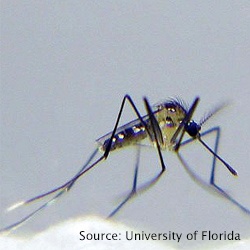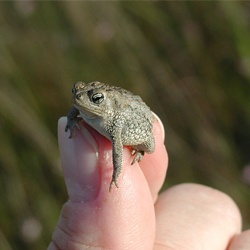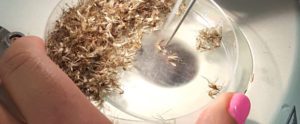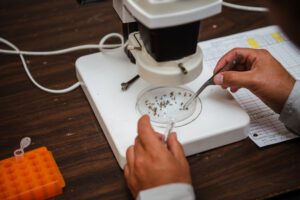Written By Theodore Heron, Surveillance Technician
Beauty can be found in the smallest of things. Last month we focused on the largest mosquito, or “elephant mosquito,” Toxrhynchites rutilus. However this month, we are at the opposite end of the spectrum with the smallest mosquito —Uranotaenia lowii, also known as the pale-footed Uranotaenia.
 Much like its overly-sized relative, the pale-footed Uranotaenia has no interest in humans. This lack of interest, combined with its small size, leaves the species often unnoticed in mosquito management and surveillance programs. While the mosquitoes ignore humans, other living creatures aren’t as fortunate. The tiny mosquitoes get their blood-meals from reptiles and amphibians—mostly frogs. Throughout the world, amphibian populations are drastically declining, and many scientists believe habitat destruction and climate change are the primary culprits. Very little is known about how mosquitoes affect non-human species. So, this is entirely speculation, but vector-borne disease may be an additional contributor to this decline. Uranotaenia lowii resides within several pockets of the Western Hemisphere, including the U.S. Gulf states from Texas to Florida, and along the Atlantic seaboard, as far north as North Carolina.
Much like its overly-sized relative, the pale-footed Uranotaenia has no interest in humans. This lack of interest, combined with its small size, leaves the species often unnoticed in mosquito management and surveillance programs. While the mosquitoes ignore humans, other living creatures aren’t as fortunate. The tiny mosquitoes get their blood-meals from reptiles and amphibians—mostly frogs. Throughout the world, amphibian populations are drastically declining, and many scientists believe habitat destruction and climate change are the primary culprits. Very little is known about how mosquitoes affect non-human species. So, this is entirely speculation, but vector-borne disease may be an additional contributor to this decline. Uranotaenia lowii resides within several pockets of the Western Hemisphere, including the U.S. Gulf states from Texas to Florida, and along the Atlantic seaboard, as far north as North Carolina.
Don’t let size fool you, as these little insects are real eye candy. This species has long dark hind legs, with the last segments covered in contrasting bright white scales. The thorax is marked with a pattern of iridescent light blue scales against a background of brown on the head, abdomen, and thorax. The proboscis is dark and club shaped.
 Along with the unique beauty of the species comes a unique host-seeking method. The majority of mosquitoes find their blood source by following carbon dioxide plumes, along with thermal taxis. Based on the Uranotaenia lowii host preference, one may surmise that their habitat consists of grassy, shallow margins of ponds and lakes, usually with moderate sunlight. So how does a pond-dwelling mosquito that feeds on cold-blooded prey locate their next meal? Research conducted in Costa Rica suggests that females of this little species have the ability other mosquitoes may not possess—acoustic sensitivity. Some researchers believe they may even have special sensory abilities. While some male mosquitoes are attracted to the noise of their female counterparts, Uranotaenia lowii is the only known species where females may utilize acoustic sensitivity to find an amphibian bloodmeal.
Along with the unique beauty of the species comes a unique host-seeking method. The majority of mosquitoes find their blood source by following carbon dioxide plumes, along with thermal taxis. Based on the Uranotaenia lowii host preference, one may surmise that their habitat consists of grassy, shallow margins of ponds and lakes, usually with moderate sunlight. So how does a pond-dwelling mosquito that feeds on cold-blooded prey locate their next meal? Research conducted in Costa Rica suggests that females of this little species have the ability other mosquitoes may not possess—acoustic sensitivity. Some researchers believe they may even have special sensory abilities. While some male mosquitoes are attracted to the noise of their female counterparts, Uranotaenia lowii is the only known species where females may utilize acoustic sensitivity to find an amphibian bloodmeal.
The species offers a delightful sight under a microscope; however, the lack of current research pertaining to Uranotaenia leaves more questions than answers about the possible ecological role this species may play in the waning populations of their amphibian victims.
VDCI is committed to public education and spreading awareness throughout the U.S. about the dangers of mosquito-borne diseases and their preventability, with the overarching goal of reducing illness and fatality statistics. Our dedicated and experienced staff works tirelessly to prevent the spread of mosquito-borne diseases in all of the contracts we service. If you would like more information about any aspect of an Integrated Mosquito Management (IMM) Plan, including mosquito surveillance, disease testing, or adult control, please contact Vector Disease Control International (VDCI) and we will help you get started immediately.
Theodore Heron is an experienced Surveillance Technician at Vector Disease Control International. He can be reached through the VDCI website or by calling 800.413.4445.
Contact the professionals at 800.413.4445 for all of your integrated tick and mosquito management needs.
Since 1992, Vector Disease Control International (VDCI) has taken pride in providing municipalities, mosquito abatement districts, military bases, industrial sites, planned communities, homeowners associations, and golf courses with the tools they need to run effective integrated tick and mosquito management. We are determined to protect the public health of the communities in which we operate. Our tick and mosquito management professionals have over 100 years of combined experience in the field of public health, specifically vector disease control. We strive to provide the most effective and scientifically sound mosquito surveillance and control programs possible based on an Integrated Mosquito Management approach recommended by the American Mosquito Control Association (AMCA) and Centers for Disease Control and Prevention (CDC). VDCI is the only company in the country that can manage all aspects of an integrated tick and mosquito management program, from surveillance to disease testing to mosquito aerial application in emergency response situations.




